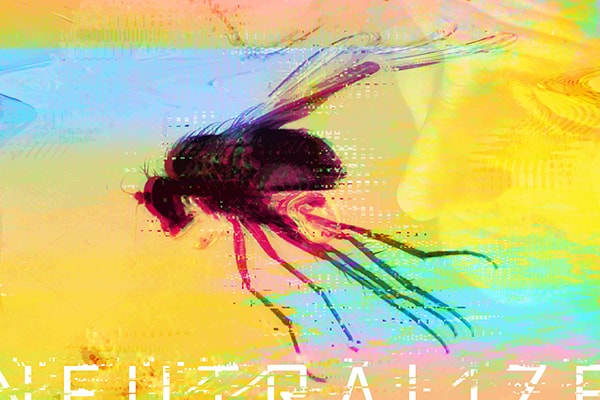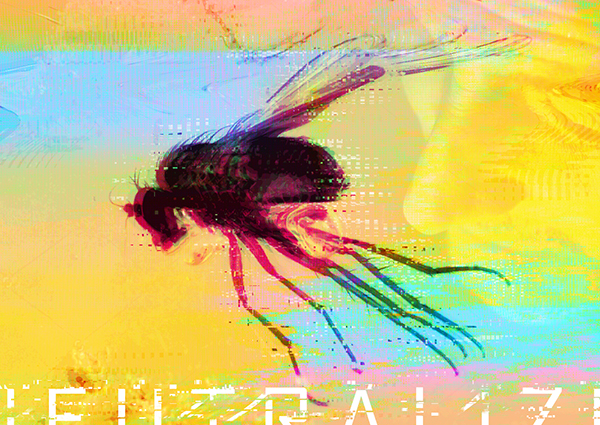
It’s raining when Hugh arrives at the gates of Jerusalem, and the skirmish is already well underway. Roman legionnaires are hacking at faceless creatures in dark blue skin suits. The skin suits are shooting back with laser cannons. The bone-thin, nailed-up figure moans and bleeds, the usual morbid backdrop to this muddy melee.
Hugh sighs. He affixes his pocket amplifier, tells the time pirates that if they don’t stop shooting and come quietly, they’ll all be neutralized. The Romans stop hacking and stare. The pirates—the few who aren’t already scattered in pieces all over Calvary—are mostly docile. Hugh quickly vaporizes the remaining Romans, along with the bits of hacked pirates and lasers, makes sure the poor skeletal man is still securely fastened to his crucifix. He seems too far gone, thank goodness, to register what’s happening around him.
I had Hitler’s bunker today, she said. Everything tastes like shit after that.
What did you have today? asks Polly, back at the base. She is eating sort-of-cheeseburgers, hideous gray things from the canteen that look like moldy plaster. Hugh shudders, distracted by such terrible food. He is distracted by so many things lately. I don’t know how you can eat that shit, he says. Before he was a Cleaner—before the Scarcity began—he was the head chef at a fairly decent restaurant in Midtown.
Polly shrugs. I had Hitler’s bunker today, she said. Everything tastes like shit after that. Hugh doesn’t blame her. Hitler’s bunker is one of the worst runs. The neofascists shouting down the Nazi-hunters and Eva Braun’s operatic screams and those fucking dogs trying to bite everybody in between. By the time the Cleaners arrive, at least dear Adolf is usually dead, but sometimes he isn’t. And that’s difficult, too. Because you try looking at that mad, paste-white face, screaming itself into a mottled beet soup, you try, when your great-aunt was crushed to death on a transport between Terezin and Auschwitz, only six years old and small as a toddler, you try to stay your hand and save that furious face for its own damned death. It takes all the effort you can muster, and sometimes, every once in a while, Hugh has arrived on the scene only to find another Cleaner standing before the lifeless body, fatally unable to resist the urge.
So Hugh can’t begrudge Polly the cheeseburgers, no matter how rancid. This morning I had the Crucifixion, he said. That’s never too bad. But this afternoon I have the Little Princes.
She looks at him sympathetically, her mouth a moue of gray gristle. They had a thing once, he and she, a few years ago. It was more of an understanding, really: after the worst of them—the Little Princes, the Children’s Crusade, the Black Plague, Lidice, Nanjing—he’d spend the night at her place, nothing untoward, just hanging onto each other, really. As if the weight of all that death could be shared; as if the overflow of horror could be held, could be contained between two bodies. She finally put a stop to it—said it was just too morbid, and anyway she was planning on leaving the Cleaners soon. I’m getting old, she said. I want kids. I want to stop aging faster than everybody else around me.
Of course, you don’t really leave the Cleaners. It’s too hard to adjust, after, to the slow molasses of real time wrapping itself around you. It’s too hard to count the seconds, the minutes, time steadily stalking forward, leaving you behind. It’s hard to be the fly trapped in amber.
When the time machines were new, the public was furious they couldn’t visit the future. No matter how many times the scientists patiently explained about fixed and unfixed points in time, about the instability swirling around an unfixed point, the public didn’t get it. They were even angrier that they couldn’t change the past. They wouldn’t listen, they wouldn’t follow the rules, and they planned trips to save Lincoln, to kill the slavers, to stop Rome burning and change Truman’s mind about the bomb. They wanted to bring penicillin to the Plague, and artificial limbs to Civil War battlefields. They wanted to save the dodo, the rhino, the snow leopard, the honeybee, the whale. They wanted to save their loved ones, and sometimes, themselves. An astonishingly large number of them wanted to save Elvis. They planned lesser things, too, little things: revenges and romances and get-rich schemes. And so the machines were tightly secured, remained in the hands of the trained: the scientists, the military, the historians. Guided tours were given to special VIPs and reporters, to certain eras and events—but no solo trips. Of course the illicit machines sprang up anyway, badly made but worth billions, and the space pirates sprang up with them—and the Cleaners were formed to take care of these mercenaries of time.
Hugh’s been a Cleaner now for ten years. It’s a difficult, unrewarding job, with shitty pay and benefits. Sure, you get to See the Centuries!—like the brochure says. That’s what hooked him. But all you see are the horrors of history. And all you do is stop people from stopping them. A year ago he brought the pox blankets back to the natives after a well-meaning group of illegal tourists stole them away. On return he had a sort of quiet breakdown. He took a month of leave, sat around eating garbage and watching TV, stared at the place in his wall where he put his fist through after his wife walked out. After they lost their little girl to the Avian Flu Pandemic. His wife had screamed and screamed at him to go back and save her, save her, but how do you save someone from a virus? There was nowhere in the folds of the world to hide, back then—the Flu was everywhere, from the biggest cities to the remotest villages. He’d almost died of it himself. His lungs have never been the same.
The Little Princes run is rougher than usual. A couple of crazy British tourists are with the pirates and they keep shouting terrible things while they’re being handcuffed. They call him a child-killer. The two fair-haired little boys look on wide-eyed, too afraid and too proud to cry, and at last he lets Richard’s men get on with it, training his eyes on the stone floor so he doesn’t see it, though he can still hear the muffled shouts. Smothered. He’d always wondered, before this gig, and now he knows. It’s not a thing he’s glad to know. His daughter was blond. She was just learning how to read, and when she was stuck on a word she absently twirled her yellow curls into knots, over and over again.
He doesn’t much like where his thoughts are headed these days. Night places. Tangled and pitch-dark.
Sometimes he wonders if it would really be so bad, letting people flood into history like a tidal wave and sweep away the worst of it. Sure, the paradoxes would destroy us, but so what? Did a world that let happen the Holocaust and Hiroshima and the Trail of Tears and Stalin and Genghis Khan and Pol Pot deserve to be spared? He lies on his bed for a while, the two little princes’ blond heads drifting down the dark river of his brain. The terrain is more and more obscured in there; he doesn’t much like where his thoughts are headed these days. Night places. Tangled and pitch-dark. He messages Polly, hoping it’s still the same address.
Want to come over? he asks. The answer flashes back fast: Can’t. BF’s here. Sorry.
Hugh stares at the fist-sized hole in the wall. He never bothered to get it fixed after she left. He’s never bothered to clean up the place, either, after the wild hurricane she became before she packed up and blew out of town. He has no idea where she is. He hopes she’s okay. If he’s perfectly honest with himself, it was bound to end badly; they weren’t well-suited and they fought much of the time. He was never faithful to her. The only good they ever made together was the little girl.
He puts his fist into the hole, feels the sharp edges of cheap plaster crumble around it. He wishes he could push his whole body into the wall, through the wall, to somewhere outside history entirely.
At work the next day he suits up and heads to the dock. Polly is there and she touches his arm; You okay? she asks.
Fine, he says, shrugging. Just a bad night last night, that’s all. I shouldn’t have messaged you.
It’s cool, she says. I’m around if you need to talk, okay? Just not when Pete’s there—he doesn’t understand. How hard it is for us, you know? It seems harder these days… Her voice is braided with tension, rough. He wonders.
Where you off to this morning? he asks.
Theresienstadt, she says, and frowns. A hypothermia epidemic, November ’43.
Theresienstadt. The name the Germans gave to Terezin, long ago christened after the Emperor’s mother. Hugh’s Czechoslovakian great-aunt is still there in 1943, just shy of her sixth birthday. She acts in the little plays they put on at the camp for the Red Cross officials. She still, despite everything, loves to sing. In time, in this machine-bound stretch of time, she is still alive; it is documented, it is a fact. It is a gift.
Hey, I just have Caesar’s assassination today, he says. Let me switch with you. Please?
I don’t think so, Polly says, shaking her head. We could get fired.
Just tell them I stole it, then. Just tell them I made you. Tell them anything, I don’t care, he says, and he’s already running to her machine, he’s already climbing in, he’s already checking the controls, the location, the date: November 13, 1943—the Bohušovicer Kessel Census in the yard at Terezin. Polly is shouting but he’s already closed the door against her face, a mouthing fish in the cold blue light of the docking bay, then gone, forgotten in the time blur, everything forgotten on the way to save the only child he can.
And now he understands the tourists. He knows, even in the blur he knows they’ll come for him, they’ll find her, they’ll make sure she’s on that cattle car in 1944. But for right now—for an hour maybe, for a minute, for just one revolution of the second hand in space—he’ll have sounded a note, he’ll have saved a life, he’ll have wiped a stain from history before the men and women like him come and put it all to wrong once more.
